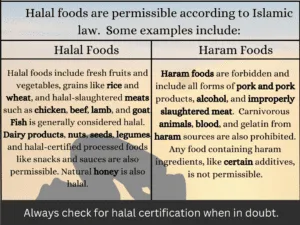In Islam, food and lifestyle choices are not merely personal preferences but acts of worship. What a Muslim consumes directly affects both the body and soul. This is why the concepts of halal (permissible) and haram (forbidden) are central to Islamic dietary and ethical laws. For Muslim consumers worldwide, understanding which products and foods are halal and which are haram is essential to living a life aligned with faith.
What Does Halal Mean?
The Arabic word halal (حلال) means “permissible” or “lawful.” It refers to anything that is allowed according to Islamic law (Shariah). When it comes to food, halal means that the item is free from anything prohibited by Allah, and if it involves animal meat, it must be slaughtered in the prescribed Islamic manner (dhabiha).
The Qur’an clearly says:
يَا أَيُّهَا النَّاسُ كُلُوا مِمَّا فِي الْأَرْضِ حَلَالًا طَيِّبًا
“O mankind, eat from whatever is on earth [that is] lawful and good.” (Surah Al-Baqarah 2:168)
Thus, halal does not only mean lawful but also pure, clean, and beneficial.
What Does Haram Mean?
The word haram (حرام) means “forbidden” or “unlawful.” Any product, food, or action that is explicitly prohibited in the Qur’an or Sunnah falls under this category. Consuming haram products is a major sin and can negatively affect a Muslim’s spiritual state.
The Prophet ﷺ said:
إِنَّ اللهَ طَيِّبٌ لاَ يَقْبَلُ إِلاَّ طَيِّبًا
“Indeed Allah is pure and accepts only what is pure.” (Sahih Muslim)
This hadith highlights the importance of avoiding what is haram and consuming only that which is halal and wholesome.
Common Examples of Halal Foods
Muslims can consume a wide variety of foods that are naturally halal and beneficial, such as:
-
Fruits and Vegetables – All plant-based foods are halal unless prepared with haram additives.
-
Grains and Legumes – Rice, wheat, oats, beans, and lentils.
-
Meat and Poultry – Only if the animal is halal (cow, goat, sheep, chicken) and slaughtered in the Islamic way.
-
Seafood – Most scholars agree that all seafood is halal, though some schools restrict shellfish.
-
Dairy Products – Milk, cheese, and butter from halal sources.
-
Halal-certified processed foods – Products with halal logos ensuring no haram ingredients are included.
Common Examples of Haram Foods
Some foods and products are clearly forbidden in Islam, including:
-
Pork and Pork By-products – The Qur’an explicitly forbids pork in several verses (Surah Al-Baqarah 2:173).
-
Dead Animals (Carrion) – Animals not slaughtered according to Islamic law.
-
Blood – Consuming blood or products made with it.
-
Alcohol and Intoxicants – Beverages and food cooked with alcohol are strictly prohibited.
-
Improperly Slaughtered Animals – Meat not slaughtered in the name of Allah.
-
Certain Additives (E-Codes) – Some food additives, such as gelatin, enzymes, and emulsifiers, can be haram if derived from pork or non-halal animals.
The Grey Area: Mashbooh (Doubtful)
Not everything falls neatly into halal or haram. The category of mashbooh (مشبوه) refers to doubtful or questionable items, where the source or preparation is unclear. Examples include:
-
Gelatin – Can be halal if sourced from halal-slaughtered animals, but haram if from pork.
-
Enzymes and Rennet – Used in cheese production, may come from halal or haram animals.
-
Processed Foods – Packaged snacks, candies, or fast food often contain hidden ingredients like flavourings, emulsifiers, or alcohol-based preservatives.
The Prophet ﷺ advised:
دَعْ مَا يَرِيبُكَ إِلَى مَا لَا يَرِيبُكَ
“Leave what makes you doubtful for what does not make you doubtful.” (Tirmidhi)
This means Muslims should avoid doubtful products whenever possible.
Halal Beyond Food: Everyday Products
Halal and haram are not limited to food. Many everyday products also fall under these categories:
-
Cosmetics and Skincare – Some contain alcohol or animal-derived ingredients.
-
Medicines and Supplements – Gelatin capsules and alcohol-based syrups may be haram.
-
Household Items – Cleaning agents or processed goods with animal by-products.
-
Finance and Business – Halal living extends to earning income in a permissible way, free from interest (riba) and unethical practices.
Why Halal and Haram Matter
For Muslims, consuming halal is not just a dietary choice but a spiritual obligation. What enters the body impacts prayer, spirituality, and acceptance of deeds. Halal ensures cleanliness, health, and obedience to Allah, while avoiding haram protects from sin and harmful effects.
The Qur’an warns:
وَلَا تَأْكُلُوا مِمَّا لَمْ يُذْكَرِ اسْمُ اللَّهِ عَلَيْهِ وَإِنَّهُ لَفِسْقٌ
“Do not eat of that upon which the name of Allah has not been mentioned, for indeed, it is grave disobedience.” (Surah Al-An’am 6:121)
Final Thoughts
The distinction between halal and haram products and foods is a vital aspect of Islamic living. Every Muslim is encouraged to seek knowledge, check product labels, and choose halal-certified items whenever possible. In a globalised world filled with processed foods and hidden ingredients, vigilance is necessary.
By choosing halal and avoiding haram, Muslims not only safeguard their health but also strengthen their connection with Allah, ensuring their lifestyle remains pure, ethical, and spiritually fulfilling.
